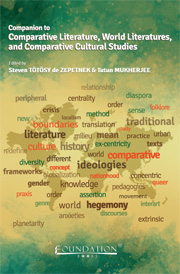Book contents
- Frontmatter
- Contents
- Introduction to the Companion to Comparative Literature, World Literatures, and Comparative Cultural Studies
- PART 1 Theories of Comparative Literature, World Literatures, and Comparative Cultural Studies
- PART 2 Comparative Literature in World Languages
- African Literatures as World Literatures
- Comparative Literature in Arabic
- Comparative Poetics in Chinese
- Comparative Literature in French
- Comparative Literature in German
- Comparative Literature in Iberian Spanish and Portuguese
- Comparative Literature in Indian Languages
- Comparative Literature in Italian
- Comparative Literature in Latin American Studies
- Comparative Literature in Russian and in Central and East Europe
- Comparative Literature in the United States
- PART 3 Examples of New Work in Comparative Literature, World Literatures, and Comparative Cultural Studies
- PART 4 Multilingual Bibliography of Books in Comparative Literature, World Literatures, and Comparative Cultural Studies
- Index
Comparative Literature in Latin American Studies
from PART 2 - Comparative Literature in World Languages
Published online by Cambridge University Press: 05 April 2014
- Frontmatter
- Contents
- Introduction to the Companion to Comparative Literature, World Literatures, and Comparative Cultural Studies
- PART 1 Theories of Comparative Literature, World Literatures, and Comparative Cultural Studies
- PART 2 Comparative Literature in World Languages
- African Literatures as World Literatures
- Comparative Literature in Arabic
- Comparative Poetics in Chinese
- Comparative Literature in French
- Comparative Literature in German
- Comparative Literature in Iberian Spanish and Portuguese
- Comparative Literature in Indian Languages
- Comparative Literature in Italian
- Comparative Literature in Latin American Studies
- Comparative Literature in Russian and in Central and East Europe
- Comparative Literature in the United States
- PART 3 Examples of New Work in Comparative Literature, World Literatures, and Comparative Cultural Studies
- PART 4 Multilingual Bibliography of Books in Comparative Literature, World Literatures, and Comparative Cultural Studies
- Index
Summary
Abstract: In her article “Comparative Literature in Latin American Studies” Sophia A. McClennen argues for the comparative study of Latin American literature in order to accord the field more canonical status both in Latin American Studies in Anglophone North America and in Latin American humanities scholarship. Believing in the efficacy of the comparative method and in its implicitly egalitarian approach to the world's languages and literatures, McClennen's intention is not to weaken or diminish comparative literature as a politically and intellectually important form of literary study but to strengthen it in order to open it up to the authors, texts, and traditions of one of the world's most complex and challenging cultural conglomerates, Latin America.
Introduction
Because of the sheer breadth of fields in Latin American studies and because of their complex histories, any investigation into the critical intersection between Latin American Studies, comparative literature, and (comparative) cultural studies must by necessity be partial, provisional, and heuristic. My interest lies in the tracing of the historic disarticulation between humanistic studies of Latin America in the U.S. and the traditional practice of comparative literature while paying attention to the ways that cultural studies has influenced contemporary practice in both areas. I also discuss comparative literature and its situation in Latin America proper.
Latin America has historically been marginalized in North American Anglophone comparative literary studies and dialogue between the fields has been minimal.
- Type
- Chapter
- Information
- Companion to Comparative Literature, World Literatures, and Comparative Cultural Studies , pp. 324 - 336Publisher: Foundation BooksPrint publication year: 2014

